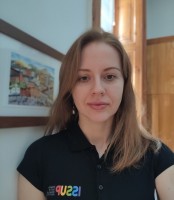
My name is Olha Myshakivska and I am a MD psychiatrist currently working in the Institute of Psychiatry of Taras Shevchenko National University of Kyiv, Ukraine. Previously, I completed my medical studies at the Lviv National Medical University and was awarded MD with specialization in psychiatry. Between 2013 and 2017, I pursued a PhD degree at the Ukrainian Research Institute for Social and Forensic Psychiatry in Kyiv, where I researched the course of neuropsychiatric symptoms in patients with dementia throughout time. In 2014, I was selected for the ATTC project and started the course of educational trainings that helped me deepen my knowledge in the field of addictions and drug demand reduction. Currently, I am conducting trainings, supervisions, and help to improve the motivational interviewing skills among specialists who work with people using substances. Besides, I am further advancing my professional education by participating in UTC trainings. Since February 2019, I have been the National Trainer and Supervisor of MHGAP-IG, and since October 2019 - National Trainer and Supervisor of Ukraine I-ATTC. Since July 2020, I have been working with ISSUP as National Chapters Coordinator in Asian region, and with WHO and UN as Consultant.
Abstract
Comparison of the results received from Kazakhstan, Pakistan and Ukraine on the role of family in substance use disorder
Objective, rationale:
The impact of having a family member with a substance use disorder can be a significant life circumstance for other family members. There is lack of prevention and understanding of the treatment provided for families in many countries, that do not focus on the family needs while providing interventions for a subject with substance use disorder. This research identifies a range of learnings about the role of family members and substance users across three countries: Kazakhstan, Pakistan and Ukraine.
Methodology:
ISSUP Pakistan, ISSUP Kazakhstan and ISSUP Ukraine undertook a joint research project “Substance Use and the Role of Families”. Respondents were family members living with those who had a substance use disorder. During the online survey conducted among the family members the type of relationship in the family was identified, attitudes to substance use and to treatment and the recovery process were evaluated, and a review to identify if any interventions were being conducted with families in their country was included. The level of significance adopted was p < 0.05.
Results:
In total 1099 responses of the survey were collected from family members of the subjects who use substances in Kazakhstan, Pakistan and Ukraine.
Analysis of the results received from each of the countries revealed that most of the responders in these three countries identified their role as “protection of subject from the negative consequences of their substance use and taking on responsibilities and achievement-oriented role”. Relating to a role as “strong emotional involvement, warm and supportive relationship” came mostly from biological parents in different countries – 66 % or 730 replies from the three countries.
47% of the family members did not receive any therapeutic interventions. In Kazakhstan, Ukraine and Pakistan 77% of the family members agreed that substance use negatively impacted them. 55% of responders reported that functioning of the family worsens, and in total 87% believed that treatment can be an effective option to address the issue of drug use.
Family members were asked: What is the best way to treat a SUD? In each of the three countries most replied that the best way was to isolate those using substances in the health care facility - 69% responded from three countries, 66% in Kazakstan, 71% in Ukraine and 71% in Pakistan.
77% in Kazakhstan, 84% in Pakistan and 76% in Ukraine felt “shame” - a feeling of guilt, regret, or sadness because of family member using substances.
The biggest challenges that family members are facing with respect to family members who use substances are fears about relapse and the inability to trust.
Conclusions:
Family plays a very important role in treatment and recovery of those with substance use disorders. This study has highlighted that most of the relatives in Kazakhstan, Pakistan and Ukraine were not involved in the therapeutic interventions, and substance use of their family member has negatively impacted them and worsened the functioning of the family.